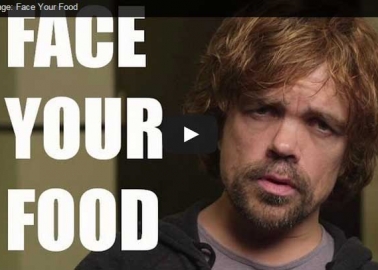Halloween on the Farm
When you think Halloween, images of pumpkins, costumes, and scary movies may come to mind. It’s some people’s favourite holiday, planned around a whole weekend of dressing up, eating copious amounts of treats and sweets, and relishing ghost stories. Have you ever thought about the animals, though? The horrors that we watch in films often chillingly reflect the everyday, lifelong abuse that animals are subjected to on farms.
From chains and imprisonment, dark cages, and losing loved ones to violent slaughter – the fear many of us embrace from a place of safety one night a year is real for animals every day.
Murdered for Meat
The meat industry is by far the biggest killer of animals around the world. It’s also responsible for relentless, routine cruelty to pigs, sheep, cows, chickens, ducks, geese, and other animals on farms, who suffer for every minute of their short lives.
The horror story is similar for all animals reared for their flesh. Females are repeatedly forcibly impregnated. Babies are torn away from their mothers, mutilated, and kept in filthy and severely crowded conditions. Then, often when they’re only a few months old, they endure a stressful and terrifying trip to the abattoir, where many are ineffectively stunned and killed while still conscious.
In 2021, it’s hard to walk down the street without seeing a sign advertising some new delicious vegan option. From “facon” to vegan chicken, there are so many choices that don’t hurt animals. We compiled the very best of them for you in our Vegan Food Awards 2021.

The Misery Behind Milk
Life on a dairy farm is a real nightmare for cows. Treated as milk-producing machines, they are selectively bred to produce unnaturally high volumes of milk. Their calves are taken away within 36 hours, causing grief and anguish to both mother and calf. Mother cows often bellow and call out frantically for their young for several days after they are separated.
Cows may spend their entire lives standing on concrete floors. They are fed unnatural, high-protein diets – which include dead chickens, pigs, and other animals – to make them produce a higher yield of milk. A cow in the UK today typically produces 4.5 times more milk than she would need to feed her calf. As a result, these cows frequently suffer from painful udder inflammation, or mastitis, which leads to higher levels of pus and bacteria in their milk.
The strain of continual pregnancy exhausts cows and often leaves them lame. When they can no longer produce such high volumes of milk, they are killed.
It is time to face the truth: unless you’re a baby cow, you have no need for the mammary secretions of a cow. For adding to your tea or making a smoothie, there’s a plant milk for every occasion.
 © Jo-Anne McArthur / Animal Equality
© Jo-Anne McArthur / Animal Equality
Bone-Chilling Cheese Platter
Cows aren’t the only victims of the dairy industry. Goats, sheep, and water buffalo also suffer for cheese.
Gentle sheep and intelligent, inquisitive goats, who are known to be patient, nurturing mothers, are impregnated over and over again only for their young to be torn traumatically from their side within hours of giving birth. Because there is little market for goat meat, male kids are usually killed as soon as they’re born. As with cows, constant milking leaves sheep and goats prone to sore, infected udders and other illnesses. And they, too, end their short lives in the abattoir.
With so many vegan cheeses available for every taste bud, you have no need to consume congealed animal milk.

Eggs From Hell
For hens on egg farms, no matter the label, existence is a living hell. In the UK, most hens are kept in vile, claustrophobic conditions.

The wire mesh of the cages rubs off their feathers, chafes their skin, and cripples their feet. Farmers cut off part of their beaks with an infra-red laser when they’re just a few days old to prevent them from pecking each other to death because of the stress of the severe crowding. The hens often suffer from broken bones and osteoporosis, and disease runs rampant in the filthy, cramped sheds. Many birds die, and the survivors are often forced to live with their dead cagemates as their bodies rot.
There are plenty of scrumptious substitutes for all uses of eggs: try a tasty tofu scramble for breakfast, and substitute bananas or applesauce for eggs in your cookies and cakes.
The Cold-Blooded Horrors of Fish Farms
Life on industrial fish farms is worse than any horror film. Nearly 50% of fish consumed in the UK come from farms, on which these sentient individuals endure intense confinement, filthy conditions, mistreatment, and high levels of disease and parasites such as sea lice. Kept in underwater cages, fish never have the chance to swim freely or exercise their natural instincts, like salmon’s powerful urge to migrate upstream each year. Ultimately, they are killed, often by being bludgeoned with a bat or having their gills cut without stunning.
Farmers lace fish feed with chemicals and antibiotics to try to counteract the harmful effects of severe crowding and with drugs that unnaturally accelerate growth. These substances harm the fish themselves, the humans who consume their flesh, and the local environment by contaminating the surrounding waters.
Keep fish in the sea and off your plates. There are many kinder options to choose from – no catch.
This Halloween, Don’t Be the Monster
Every day is Halloween for animals on farms, but by making compassionate choices about the food you put on your plate, you can help end the horrors of their terrifying Groundhog Day. PETA is here to help – sign up for our World Vegan Month Challenge for November, and we’ll send you tips, recipes, and inspiration.



